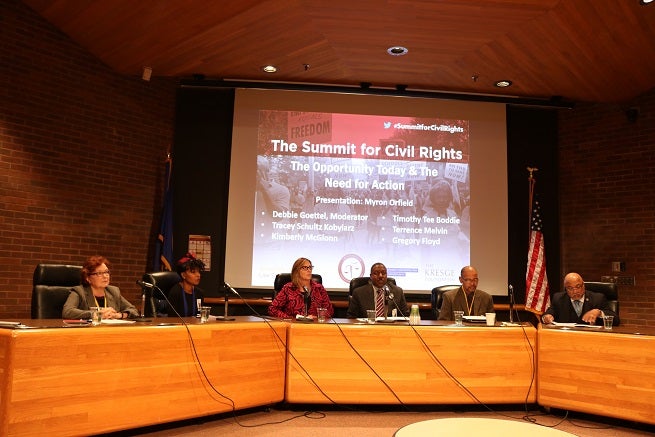Uncategorized
Teamsters’ Floyd Continues Union’s Civil Rights Commitment

The Teamsters have for decades been an outspoken voice for social justice not only for its members, but for American society as well. And that commitment continues to this day.
Recently, Gregory Floyd, President of Teamsters Local 237, participated in the Summit for Civil Rights held at the University of Minnesota’s Mondale School of Law, joining Terrence Melvin, President, International Coalition of Black Trade Unionists and Secretary-Treasurer of the New York State AFL-CIO at the event.
The goal of the two-day conference was to formulate strategy to rekindle the historic civil rights movement of the 1960s and set priorities to continue the struggle by bringing together civil rights advocates, elected officials, faith-based groups and labor. The panel discussion featuring Floyd and Melvin focused on how workers’ rights and civil rights are intertwined and the significant role labor has played—and must continue to play—in the fight to end economic disparity.
In his remarks, Floyd, whose local is the largest public employees union in the IBT, noted that New York State has the highest number of union workers in the nation—nearly 25 percent. Of that, public sector workers make up the greatest amount of union workers, and African American municipal workers represent the largest group of those union workers.
Floyd asked the audience to keep in mind that “workers’ rights and civil rights have an historic, inseparable bond and that begs the question: Who has the most to lose from the actions of today’s union-bashers? The answer is easy to learn. One needs to only look at the recent referendum in New York for a Constitutional Convention. It was successfully defeated through collaboration of groups having diverse interests, and with labor unions taking a leadership role—knowing that a win would have been disastrous, especially for public sector workers whose pensions and other benefits are guaranteed in the Constitution.”
He continued, “The muscle and determination that labor showed for this issue—and the support it garnered not only within the labor movement, but among other fair-minded interest groups—must continue to help defeat the [U.S. Supreme Court’s] Janus case as well. These union-busting efforts should be viewed as what they truly are: Just other forms of denying civil rights.”
Among the other highlights of the Summit were speeches by former Vice President Walter Mondale; Congress members James Clyburn and Keith Ellison; Derrick Johnson, the President and CEO of the NAACP and Randi Weingarten, President of the American Federation of Teachers.